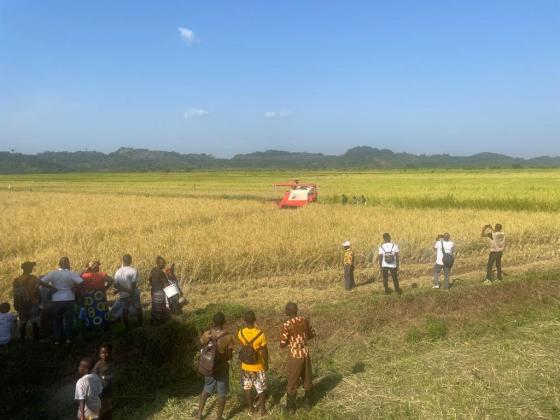Liberia: MOA’s Donor Funded Projects Impact Farmers in Bong

The lives of some smallholder rice farmers in Fuamah District, Lower Bong County, are said to have been impacted as the result of the Ministry of Agriculture’s (MOA) intervention. The intervention is under its Smallholder Agriculture Transformation and Agribusiness Revitalization Project (STAR- P) and Rural Economic Transformation Project (RETRAP).
STAR-P and RETRAP are supported by the World Bank and the International Fund for Agriculture Development (IFAD).
According to the chairman of the Fuamah Multipurpose Farmers Cooperative, Prince D. Peter, the intervention of the donor supported projects has caused them to expand production from 100 hectares to 500 this farming season to support their families.
He said that the projects provided them with cash for work, and inputs such as fertilizers and tools to expand production.
“The quick impact project provided us with cash for work that enabled us to cultivate 500 hectares. Since the end of the civil crisis [and] in the history of the cooperative, this is the first time we have been able to expand production in such a manner,” he said.
Peter spoke over the weekend during the visit of Agriculture Minister Jeanine Cooper and her entourage to their farm project site. The visit of the minister, accompanied by the Fund Advisory Committee was intended to know the level of impact the Ministry's support through the partners is making in the sector.
The Fuamah Multipurpose Farmers Cooperative is one of those cooperatives in Liberia that have enjoyed some level of donor assistance over the years. However, the cooperative is still faced with some major challenges that limit its ability to adequately supply the market.
“Since the establishment of the cooperative, we can only boast of vast swampland but production is always low because the field is not irrigated and inputs are limited. Also, we are lacking better processing capacity,” Peter said.
However, he disclosed that the Ministry of Agriculture is in the process of approving US$ 200,000 that will further enhance their production capacity.
Speaking in an interview with journalists over the weekend on the farm, Minister Cooper said that her ministry, in collaboration with international partners, intends to make the Fuamah Cooperative as one of the farm mechanization hubs to increase domestic rice production.
“This support is not just the contribution of the projects of the Ministry, but it is the involvement of all of our partners. It is the Rice Offensive Initiative that aims to invest more into rice production to reduce importation,” she explained.
Rice is the main staple for Liberians, but the country still spends close to US$200 million annually to import the commodity.
Minister Cooper said that her administration, together with the partners, is doing all it can to support the farmers to produce more rice for the market.
She said that farmers have been supported with seeds and equipment to produce more.
“We are supporting the farmers with machines to increase production. We want to put one million bags of rice on the market this farming season,” she told journalists.
With funding from the International Fund for Agricultural Development (IFAD), the STAR Project is focused on providing innovative agricultural financing, institutional capacity building and strengthening the enabling environment for farmers, agribusinesses, state, and non-state actors, as well as enhancing productivity and competitiveness.
The RETRAP project funded by the World Bank seeks to develop or enhance competitiveness and market access through productive alliances as well as strengthening agri-marketing and engaging in road infrastructure investments.
Both STAR-P and RETRAP are being implemented in the 15 counties with a combined target of 98,000 beneficiaries in the cassava, oil palm, rice, rubber, piggery, poultry and vegetable and rice value chains.
The STAR-P and the RETRAP made several interventions over the past years including the delivery of farm machines, seeds, fertilizers and other farming inputs to hundreds of beneficiaries to help transition them from subsistence farming to commercialization.
To promote access to finance, the MoA said recently that about 125 smallholder farmers and agribusinesses have so far been approved for grants, under its Liberia Agriculture Commercialization Fund (LACF).
The LACF has been set up under component two of both projects to ensure that smallholder farmers and other members of the value chains increase agricultural productivity and commercialization.
